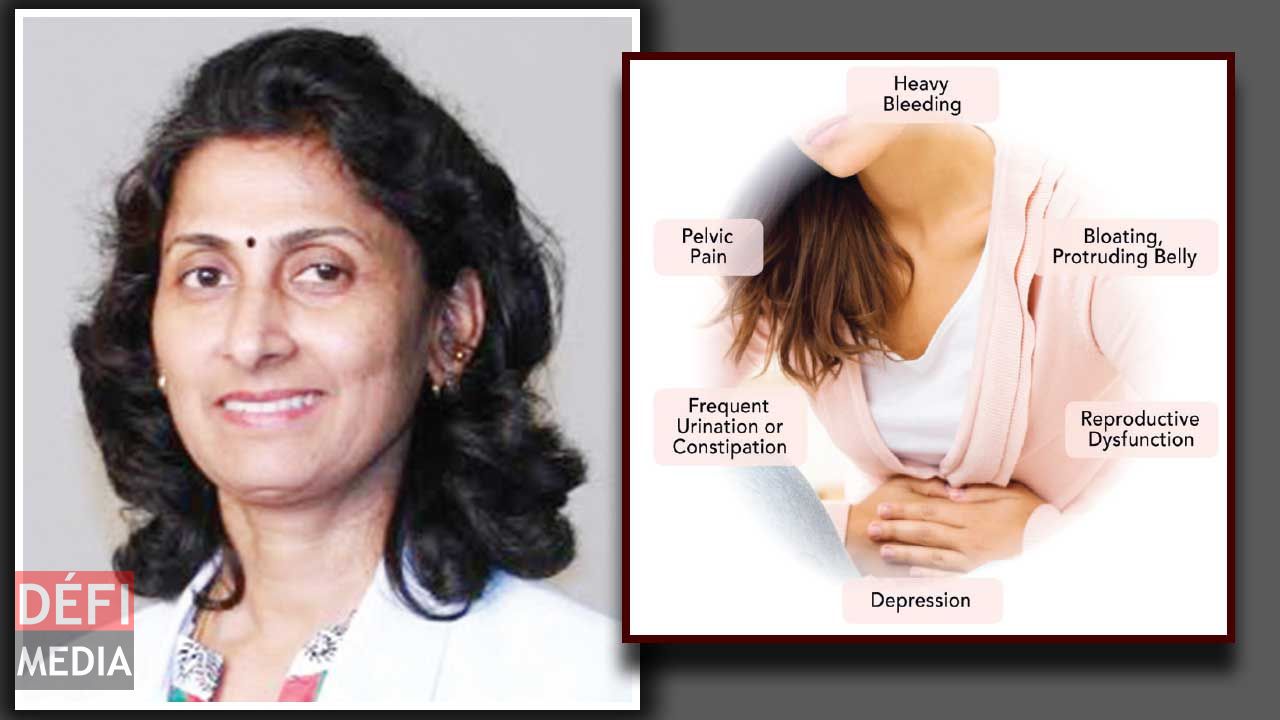
Fibroid are considered to be one of the most frequently diagnosed tumours in the female reproductive system. It is also referred as uterine myomas, leiomyomas, or fibromas. In Mauritius, we often here the term “Fibromas” and it is quite common. Two gynaecologists gave us an insight of the diseases and precautions to be taken.
Publicité
Dr Himla Bhoma, Gynaecologist and Obstetrician states that it is estimated that 30% to 70% of women can get fibroids. However, as highlighted by the doctor, only 20% visits doctors with obvious symptoms. “A very minimum percentage of the women undergo surgeries as they bleed enormously. During surgeries most of the time, the uterus is taken out. However, in unmarried patients, doctors try their best to preserve their uterus. The youngest patient I had with fibroid was 16 years old and another who necessitated a surgery was aged 27.”
The doctor explains that usually, after surgeries, women live a normal life but they cannot conceive. This is the reasons why for unmarried or young women they tried to remove the fibroids only. “Nevertheless, only the biggest fibroids are removed. The smaller ones remain in the womb.”
Causes
Dr Shilpa Sinha Gynaecologist and Obstetrician at Wellkin Hospital reveals that many women have fibroids during their lives but most women don't know they have fibroids because often they have no symptoms. “In 75% cases, they are diagnosed incidentally during routine annual check up or when seeking medical care for other conditions. If you don't produce a baby you produce a fibroid - goes a medical dictum.”
She highlights that late marriages and postponement of pregnancy till the mid or late 30's is emerging as a major cause for uterine fibroid. “Unlike in the past the detection rate of fibroids has shot up now. Advanced medical technology, advances oh health insurance and mandatory health checkups at workplace are some of the reasons for the heightened awareness about fibroids among women today. Research has indicated that uterine fibroids are also emerging as an important cause for infertility in women.”
She states that fibroids are uncommon in women under 20 years old and very common between 30 and 40 years. They shrink after menopause. “Women who are over 70 kg are more likely to have fibroids then their slender counterparts. Estrogen levels are high in heavier women. Harmones and genetics are important factors. Fibroids are dependent on estrogen and progesterone to grow. These harmones have mitogenic effect on fibroids and they act by influencing a large number of growth factors, cytokines and apoptotic factors. Genetic and hereditary causes are being considered especially for early onset cases. If mother had fibroids, the risk in the daughter is about three times higher than average. Researchers have completed profiling of global gene expressions for uterine fibroids. 80-85% of fibroids have a mutation in the mediator complex subunit 12(MED12) gene.”
Other contributory factors are as enumerated by her include:
- stress
- lack of good sleep
- lack of good diet (eating lots of processed and unnatural food which lack vitamin s and minerals)
- weak immune system leading to built up of toxins in body
Symptoms
Dr Sinha explains that Fibroids particularly when small may be entirely asymptomatic. Symptoms depend on the location and size of fibroids.
Important symptoms include:
- abnormal uterine bleeding
- heavy or painful periods
- abdominal discomfort or bloating
- painful defecation
- backache
- urinary frequency or retention
- in some cases infertility
“During pregnancy they can also be the cause of miscarriage, bleeding, premature labour or interference with the position of the fetus. Though fibroids are common they are not typical cause of infertility, accounting for 3 % of reasons why a woman may not be able to have a child. The majority of women with fibroids will have normal pregnancy outcomes. Submucosal fibroids may interfere with the function of the lining and ability of the embryo to implant. Also larger fibroids may distort or block the Fallopian tube.”
Preventive measures
The gynaecologist reveals that fibroids cannot be prevented but there is research which suggests certain life style habits can reduce the chances. “One study found that having high sugar diet may be linked to a higher risk in some women. Another study found that eating fresh fruits, cruciferous vegetables like broccoli, cauliflower and turnip could lower your odds. These are rich in beta carotene, folate, vitamin C, E, K and other minerals. Regular exercises also can lower chances of uterine fibroids.”
Danger
According to Dr Sinha, there are some dangers associated to fibroids. “Fibroids that cause heavy vaginal bleeding lead to anaemia and iron deficiency. Due to pressure symptoms gastrointestinal and bloatedness may happen. Compressions of urethra may lead to hydro nephrosis. Fibroids may lead to infertility. Rare cases malignant growths leiomyosarcoma can occur.”
Advice
Dr Bhoma advises women to opt for regular check up every three years and those in menopause to go for a blood check up each year. “It is important for our women to know the importance of regular check up in order to be in good health. It is also crucial to preserve and take good care of our uterus till a very old age.”
Myth and Realities
Myth: Birth control pills can “treat” fibroids or reduce fibroid size.
Reality: There is no evidence that this occurs. Some patients with heavy bleeding, however, may notice a decreased amount of menstrual blood loss when on birth control pills. The theory behind the use of low dose birth control pills in the treatment of fibroids, especially among perimenopausal women, is that they decrease hormonal fluctuations during the menstrual cycle, and this may decrease their stimulatory effect on fibroid growth. Birth control pills are quite useful in the treatment of endometriosis, another very common condition causing pain and bleeding and stemming from the lining of the uterus, but quite different from fibroids.
Myth: Birth control pills are bad for women with fibroids.
Reality: There is no association between birth control pills and fibroid growth or recurrence, despite the fact that they contain estrogen. There is reason to believe that women entering menopause who have large or symptomatic fibroids should defer estrogen replacement therapy or use only the smallest doses. This must be discussed with your physician on a case by case basis, considering all risks and benefits.
Myth: There is a “miracle diet” that can cause fibroids to “vanish”.
Reality: This is a wholly unsubstantiated claim. There are no dietary supplements or practices that can reduce fibroid size, nor are there any magical therapies.
Myth: You don’t need your uterus after you’ve had your children, so just remove it if it gives you any problems.
Reality: This was the prevailing medical approach until recently. We considered that once it bore our children, the womb’s job was done and it became as unnecessary-and dispensable--as the appendix. Recent research, however, suggests that the uterus is a biologically active organ that may interact with other organs such as the ovaries in ways that have yet to be understood. For example, even when a woman has only her uterus removed, her ovaries stop functioning prematurely in about half of premenopausal women without any surgical complicating factors. This may explain some of the recent surprises in studies of menopausal women on hormone replacement and their risk for various diseases. This may also explain the observation that many women who have had a hysterectomy report decreased libido and decreased sexual satisfaction, although many researchers attribute this to lost uterine contractions and cervical stimulation, which heighten the sexual response in many women.
Source: Dr Donnica Moore, M.D

Notre service WhatsApp. Vous êtes témoins d`un événement d`actualité ou d`une scène insolite? Envoyez-nous vos photos ou vidéos sur le 5 259 82 00 !





















